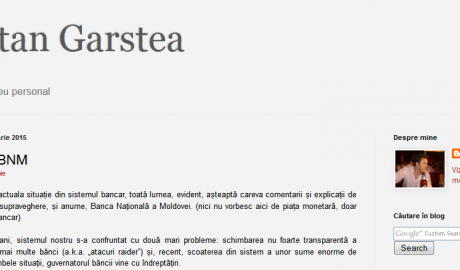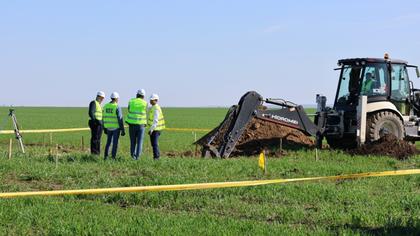În ultimii trei ani, sistemul nostru s-a confruntat cu două mari probleme: schimbarea nu foarte transparentă a proprietăţii la mai multe bănci (a.k.a. „atacuri raider”) şi, recent, scoaterea din sistem a unor sume enorme de bani. Şi, în ambele situaţii, guvernatorul băncii vine cu îndreptăţiri.
În primul caz, guvernatorul ne spune că BNM nu are suficiente pârghii şi mecanisme pentru a putea vedea cine sunt proprietarii reali ai băncilor noastre. În al doilea caz, guvernatorul ne spune că BNM nu poate verifica orice operaţiune efectuată de bănci şi când a intervenit, era deja prea târziu.
Deci, pe fiecare caz în parte.
Primele atacuri raider au avut loc acum trei ani. Trei ani, în care se puteau întreprinde orice acţiuni şi se puteau face orice modificări la legislaţie, pentru a avea pârghii şi mecanisme suficiente ca să poţi afla cine-s proprietarii reali ai unei bănci. Mai mult ca atât, în ultimii trei ani, au fost efectuate 7 (şapte) modificări la legea cu privire la Banca Naţională şi 9 (nouă) modificări la legea instituţiilor financiare. În total 16 ocazii de a schimba situaţia. Şi asta încă nu-i tot. Cel puţin două din modificările menţionate au fost făcute anume pentru a rezolva problemele cu transparenţa structurii acţionarilor şi cu prezenţa persoanelor cu reputaţie dubioasă în organele de conducere ale băncilor.
Şi tot asta pentru a afla că Banca încă nu are instrumente suficiente pentru a asigura transparenţa pe această piaţă. Mie-mi pare că chiar dacă în Constituţie ar scrie că guvernatorul băncii naţionale este Dumnezeu la noi în ţară şi are dreptul să afle orice de la oricine, el pur şi simplu s-ar închide la el în birou, ar stinge telefoanele şi nu ar mai ieşi de acolo. Fiindcă dacă vrei să obţii ceva, te uiţi ce trebuie schimbat că să obţii aceasta, schimbi, şi apoi obţii, iar dacă nu vrei să obţii ceva, vorbeşti mult, schimbi ceva irelevant, şi apoi iar vorbeşti mult.
Iar în cazul cu scoaterea banilor din câteva bănci din sistem, voi aduce exemplul educatoarei de la grădiniţă. Dacă la grădiniţă se întâmplă ceva cu un copilaş, vinovată este educatoarea. Indiferent de aceea că ei sunt mulţi şi ea nu reuşeşte să stea cu ochii pe fiecare dintre ei, sau că vorbea al telefon sau că trebuia să iasă până afară. Fiindcă ea a acceptat să lucreze educatoare, şi aceasta înseamnă că îşi asumă răspundere pentru fiecare din copiii ce-i sunt încredinţaţi.
Păi iată. Banca Naţională supraveghează sistemul nostru bancar. Desigur, nu e treaba lor să se implice în fiecare operaţiune economică a băncilor. Dar situaţia că două bănci importante din sistem să fie stoarse de lichidităţi şi puse pe butuci, iar ca urmare la aceasta cursul monedei naţionale să înceapă să cadă, evident nu poate fi admis. Şi Banca Naţională a Moldovei, care e cea mai bună bancă naţională a Moldovei, desigur că trebuia să fie gata pentru aşa situaţie, şi să dispună de mecanisme pentru a depista la primele faze astfel de scheme, şi să reacţioneze imediat pentru a le stopa. Fiindcă schema nu este nouă şi această bicicletă nu a fost inventată în Moldova.
Banca Naţională este educatoarea care răspundea de sistemul nostru bancar. Şi nu a făcut faţă situaţiei. Fie că nu a fost atentă, fie că nu a vrut, fie că nu se pricepe şi nu e bună pentru această funcţie.
Pentru majoritatea dintre noi, cetăţenii simpli, BNM este organul de stat cu cel mai direct şi imediat impact. Chiar şi legile aprobate de Parlament rareori afectează deodată şi imediat viaţa tuturor. Însă nivelul inflaţiei, preţul la produsele alimentare, serviciile comunale, combustibil, cursul valutar - toate sunt chestii cu care ne ciocnim zilnic, cu care avem de trăit. Nu aş face aşa dramă dacă ar fi vorba despre alte instituţii de stat sau alte urmări, însă azi, în urma unor acţiuni şi inacţiuni ale regulatorului nostru, majoritatea cetăţenilor noştri au rămas mai săraci decât erau cu jumătate de an în urmă. Şi acesta încă nu e sfârşitul.
Varianta în limba engleză o puteţi accesa aici.
Vedeţi mai jos varianta în limba engleză
About the National Bank of Moldova // Natana Garstea
Referring to the current situation from the banking system, everyone, obviously, is waiting for some comments and explanations from the supervising authority that is the National Bank of Moldova. (and here I am not speaking about the monetary market, but the banking system)
In the last three years our system confronted two big problems: the not quite transparent transfer of ownership of a number of banks (also known as “raider attacks”) and recently, the removal from the system of enormous amounts of money.
And in both situations, the Governor of the National Bank of Moldova is offering justifications.
In the first case, the Governor of the National Bank of Moldova, is telling us that the institution he is managing has insufficient leverage and mechanisms to see who are the real owners of our banks. In the second case, the Governor is telling us that the National Bank of Moldova cannot verify all operations that was conducted by the banks and when he intervened, it was already too late.
So, let us analyse each case separately.
The first raider attacks took place three years ago. Three years, during which it was possible to take any necessary actions and it was possible to amend the laws in order to have sufficient leverage and mechanisms in order to find out who are the real owners of a bank. Furthermore, in the last three years, 7 (seven) amendments were made to the Law on the National Bank and 9 (nine) modifications to the Law on financial institutions. In total 16 opportunities existed to change the situation. And that is not all. At least two from the above-mentioned amendments were made precisely to settle the issues regarding the transparency in the shareholders structure and regarding the presence of people with a dubious reputation in the management bodies of banks.
And all this was done for us to find out that the National Bank still does not have sufficient instruments to guarantee the transparency on this market. It seems to me that if even the Constitution would provide that the Governor of the National Bank is God in our country that has the right to do anything to anyone, he would just lock himself in his office, would turn off all phones and would not go out from his office. Because if you want a specific result, you look for what must be changed in order to get the desired result, you change and afterwards you get the result and if you do not want the result, you just talk a lot and change something irrelevant and then talk a bit more.
And in the case the money were removed from a number of banks that are parts of the system, I will use the example of the kindergarten governess. If in the kindergarten something wrong is happening to any child, the responsible person is the governess. Irrelevant of the fact if there are many children and she is not able supervise all of them, or because she was talking on the phone or because she had to step out for a while. Because she accepted to work as a governess and this means she is accepts the liability for every child she has in her supervision.
Well, this is it. The National Bank is supervising our banking system. Certainly, it is not supposed to intervene in every banking operation, it is not their business to involve in every economic banking operation. However, the situation when two important banks from the system have been drained of money and brought into a very poor situation and because of this, the exchange rate of the national currency began falling, cannot be accepted as normal. And the National Bank of Moldova, which is the best national bank in Moldova, obviously had to be prepared for such a situation and had to have the necessary mechanisms to detect right in the beginning this kind of fraudulent operations and had to react immediately in order to stop them. Because the idea is not new and this “bicycle” was already invented and it happened not in Moldova.
The National Bank is the governess that was responsible for out banking system. And it failed in doing so. May be it was negligent, may it did not want to fulfil its functions, may be it is not competent enough and is not suitable to do its job.
For the majority of us, simple citizens, the National Bank of Moldova is the state authority with the most direct and immediate impact. Even the laws adopted by the Parliament rarely have these immediate effects on everybody’s lives. But the level of inflation, the prices for food, utilities, fuel, the currency exchange rate – all of these are issues we have to confront on a daily basis and we have to live with it. I would not make a drama out of this story, but if it would be about other state institutions or other effects, it would be different, but today, because of some actions and lack of actions of our regulator, the majority of our citizens got into a poverty that is much worse than half a year ago. And this is only the beginning.
Author: Natan Garstea






